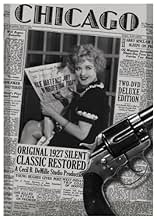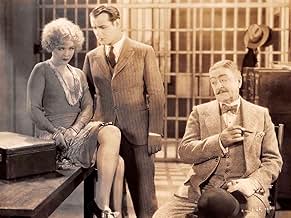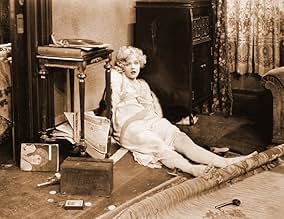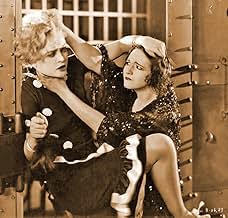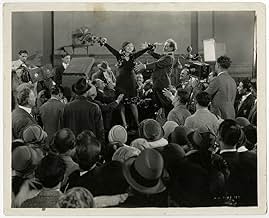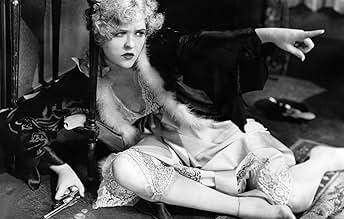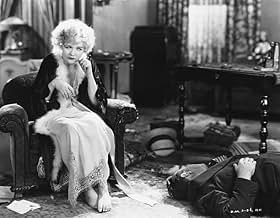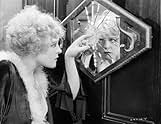AVALIAÇÃO DA IMDb
7,3/10
612
SUA AVALIAÇÃO
Adicionar um enredo no seu idiomaA wild jazz-loving and boozing wife Roxie Hart kills her boyfriend in cold blood after he leaves her.A wild jazz-loving and boozing wife Roxie Hart kills her boyfriend in cold blood after he leaves her.A wild jazz-loving and boozing wife Roxie Hart kills her boyfriend in cold blood after he leaves her.
- Direção
- Roteiristas
- Artistas
- Prêmios
- 2 vitórias no total
Emily Barrye
- Woman in Cell Reading Book
- (não creditado)
Sidney Bracey
- Bill Collector
- (não creditado)
Robert Brower
- Juror
- (não creditado)
Sidney D'Albrook
- Photographer
- (não creditado)
Jack Dean
- Assistant Prosecutor
- (não creditado)
Robert Dudley
- Insurance Agent
- (não creditado)
Jim Farley
- Detective
- (não creditado)
- Direção
- Roteiristas
- Elenco e equipe completos
- Produção, bilheteria e muito mais no IMDbPro
Avaliações em destaque
Phyllis Haver plays the sexy but fickle and material-minded wife of shopworker Victor Varconi, who seems a nice but dullish fellow. While at he's at work, Haver invites 'sugar-daddy' Eugene Pallette upstairs, not realizing that he is intending to dump her, owing to her extravagance. When Pallette refuses to cough up anymore cash, she shoots and kills him, leading to a spectacular and amusing trial.
Along the way, we have a wonderful prison scene with inmates being presided over by matron May Robson, a vindictive D. A. splendidly played by Warner Richmond, and a crooked lawyer in the form of Robert Edeson. Further amusement is provided when Varconi has scraped up $2,500 (rather a lot for a chap who works in a tobacco shop) for the defense and has to cough up the same again. He then decides to rob the fellow to get the remainder, finding it is in fact crooked money as well, having been delivered by thug Walter Long in an all-too-brief cameo, before the climactic trial. Oh, and the nice, pretty cleaning lady (Virginia Bradford) has a yen for Varconi...
The direction of CHICAGO is credited to Frank Urson, who was unknown to me, possibly due to his career being cut short by his death the following year. Other notable credits are Peverell Marley, Mitchell Leisen and Leonore Coffee, and the whole thing is very handsomely presented, with a nice score from Rodney Sauer.
Along the way, we have a wonderful prison scene with inmates being presided over by matron May Robson, a vindictive D. A. splendidly played by Warner Richmond, and a crooked lawyer in the form of Robert Edeson. Further amusement is provided when Varconi has scraped up $2,500 (rather a lot for a chap who works in a tobacco shop) for the defense and has to cough up the same again. He then decides to rob the fellow to get the remainder, finding it is in fact crooked money as well, having been delivered by thug Walter Long in an all-too-brief cameo, before the climactic trial. Oh, and the nice, pretty cleaning lady (Virginia Bradford) has a yen for Varconi...
The direction of CHICAGO is credited to Frank Urson, who was unknown to me, possibly due to his career being cut short by his death the following year. Other notable credits are Peverell Marley, Mitchell Leisen and Leonore Coffee, and the whole thing is very handsomely presented, with a nice score from Rodney Sauer.
10tybalt-2
Last night the Sam Goldwyn theatre at the Academy in Los Angeles was filled to capacity for the screening of this 1927 silent movie. The print was a restoration, by UCLA, of the original nitrate copy from the DeMille family's archives. It was a full length version, with a 10 min. intermission. Johnny Crawford's orchestra provided a live musical accompaniment, based on original scoring notes. A standing ovation at the end proves that a really well performed silent movie can stand the test of time. Phyllis Haver had a range of expressions from A to Z - fantastic - and the courtroom scene, played for comedy, was truly a highlight. If a DVD is made, as has been suggested, you're in for a treat.
I really liked this film, viewed from the UCLA print. Phyllis Haver, now all but forgotten, shines as Roxie Hart, a good time girl who despises her husband and seeks sugar daddies for fun. As soon as you see her pretending to sleep, having discarded her garter with bells attached, you know she's trouble.
So Roxie kills, and goes to jail, and because she's blonde and pretty, she's taken up by the media in this wild world of flappers and jazz. Those familiar with the musical film with Renee Zellweger and Catherine Zeta-Jones will be wondering 'where's Velma?' but that character isn't in the forefront at all. This film is all about Roxie, and, more than the musical version, to some extent about her cuckolded husband Amos. Here we see his point of view on several occasions, and even follow him in scenes where Roxie doesn't appear. Victor Varconi puts in a lovely performance as Amos in this film.
Haver might dominate the proceedings, and lights up what is already a fast-moving and effective bit of jazz fluff, but there's a good, if brief performance from Eugene Palette as well. As Casely he is very watchable indeed.
As this was a late silent, the acting styles are mainly naturalistic, and the fact that it does not have sound, only titles, doesn't matter a bit when it comes to following the story. Miss Haver acts her heart out anyway and you can feel her contempt, her fear, her desperation, just as you would if you could hear it.
A superior film, and one which occasionally makes it out for public showings. A great pity it isn't on DVD as it is extremely enjoyable and deserves a wider potential audience.
So Roxie kills, and goes to jail, and because she's blonde and pretty, she's taken up by the media in this wild world of flappers and jazz. Those familiar with the musical film with Renee Zellweger and Catherine Zeta-Jones will be wondering 'where's Velma?' but that character isn't in the forefront at all. This film is all about Roxie, and, more than the musical version, to some extent about her cuckolded husband Amos. Here we see his point of view on several occasions, and even follow him in scenes where Roxie doesn't appear. Victor Varconi puts in a lovely performance as Amos in this film.
Haver might dominate the proceedings, and lights up what is already a fast-moving and effective bit of jazz fluff, but there's a good, if brief performance from Eugene Palette as well. As Casely he is very watchable indeed.
As this was a late silent, the acting styles are mainly naturalistic, and the fact that it does not have sound, only titles, doesn't matter a bit when it comes to following the story. Miss Haver acts her heart out anyway and you can feel her contempt, her fear, her desperation, just as you would if you could hear it.
A superior film, and one which occasionally makes it out for public showings. A great pity it isn't on DVD as it is extremely enjoyable and deserves a wider potential audience.
Chicago in the mid 20's of the last century.
In this modern Amerikan city reside the Hart's, a young married couple, who adapt to the spirit of the big city. Herr Amos Hart works in a tobacco store and Frau Roxie Hart does absolute nothing but to be unfaithful to her husband with an old man. The old-timer accommodates her whims although this is coming nearly to an end. So when Frau Roxie hears this news; she, who is a bad, bad girl ( besides a peroxide blonde with no brains ... excuse this Herr Graf for such obvious remark ) kills her lover in her apartment.
Desperate over what she has done, she calls for help to her husband telling him that the old man tried to get advantage of her. Herr Hart who is a good man but not stupid at all, discovers what really happened in there. But his love for Roxie is so important to him that he decides to help her by taking the services of a famous, greedy and unscrupulous advocate ( excuse again this Herr Graf for such an obvious remark ); this in order to defend his wife from the death penalty. However, such favour has an expensive price – 5.000 grand that obviously Herr Hart doesn't have.
During a visit to his greedy advocate, he finds out where he hides a lot of money in his bureau and during the night steals the money ( an honourable deed indeed, to rob an advocate ). Meanwhile Frau Roxie Hart's famous trial is nearly begun.
"Chicago", a film directed by Herr Frank Urson in the silent year of 1927, was based in a Broadway play which in turn was based on a true story ( occurring in a real city! ). Reminiscences of the original stage play in its primal concept can be seen in the film, when the director uses a few sets ( the Hart's apartment, the jail or the trial court ) in order to develop the story as it were different acts of a play. This is especially during the first part of the film during the dramatic development at the Hart's apartment and at the end of the movie during the trial. However, Herr Urson makes fairly good use of the proper characteristics of the cinema film narrative in "Chicago" by, constructing excellent visual metaphors ( the jury's feet responding Frau Roxie charms, the tabloid paper going down the gutter ). There are also important and sibylline sexual remarks that are present during the whole film (ah, that garter bell belt). And let's not forget the social realism that can be seen in the film ( Chicago daily life or the Hart's apartment ). Especially outstanding is the power of the yellow press in those old days ( and unfortunately in these modern days too ); the sensationalist journals build up stories on innocent celebrities that certainly have few merits. Naturally this happened with the madcap Roxie, a situation depicted in "Chicago" in a raw and effective way.
Another merit of "Chicago" is the combination of comedy and drama in equal terms highlighting Frau Roxie's stupidity, selfishness and easy living in contrast with her self-sacrificing husband who suffers the acts and nonsense of his wife. He's a man who honestly cares about and loves his wife enough to steal and lie for her although this affection and emotion is not returned.
Starring as the couple are two excellent and not well-known actors who handle their roles considerably well. Herr Victor Varconi as Herr Amos Hart is the lovingly and humiliated husband. Frau Phyllis Haver shines and takes all the credit in the picture thanks to her brilliant performance as Roxie Hart, a madcap, simple and selfish modern girl who has no scruples combined with no brains ... who will have a moment of glory as a famous killer thanks to the help of the yellow press ... who will meet her end on the end of a rope a woman who lives her own life caring for no one except the money.
"Chicago" is an excellent silent movie for all those reasons mentioned above by this German count. Don't forget also a modern one added recently featuring a superb musical score compiled by Herr Rodney Sauer and "The Mont Alto Motion Picture Orchestra". They capture the spirit and mood of the roaring twenties of the last century.
And now, if you'll allow me, I must temporarily take my leave because this German Count must to return to the Schloss from the Windy City.
Herr Graf Ferdinand Von Galitzien http://ferdinandvongalitzien.blogspot.com
In this modern Amerikan city reside the Hart's, a young married couple, who adapt to the spirit of the big city. Herr Amos Hart works in a tobacco store and Frau Roxie Hart does absolute nothing but to be unfaithful to her husband with an old man. The old-timer accommodates her whims although this is coming nearly to an end. So when Frau Roxie hears this news; she, who is a bad, bad girl ( besides a peroxide blonde with no brains ... excuse this Herr Graf for such obvious remark ) kills her lover in her apartment.
Desperate over what she has done, she calls for help to her husband telling him that the old man tried to get advantage of her. Herr Hart who is a good man but not stupid at all, discovers what really happened in there. But his love for Roxie is so important to him that he decides to help her by taking the services of a famous, greedy and unscrupulous advocate ( excuse again this Herr Graf for such an obvious remark ); this in order to defend his wife from the death penalty. However, such favour has an expensive price – 5.000 grand that obviously Herr Hart doesn't have.
During a visit to his greedy advocate, he finds out where he hides a lot of money in his bureau and during the night steals the money ( an honourable deed indeed, to rob an advocate ). Meanwhile Frau Roxie Hart's famous trial is nearly begun.
"Chicago", a film directed by Herr Frank Urson in the silent year of 1927, was based in a Broadway play which in turn was based on a true story ( occurring in a real city! ). Reminiscences of the original stage play in its primal concept can be seen in the film, when the director uses a few sets ( the Hart's apartment, the jail or the trial court ) in order to develop the story as it were different acts of a play. This is especially during the first part of the film during the dramatic development at the Hart's apartment and at the end of the movie during the trial. However, Herr Urson makes fairly good use of the proper characteristics of the cinema film narrative in "Chicago" by, constructing excellent visual metaphors ( the jury's feet responding Frau Roxie charms, the tabloid paper going down the gutter ). There are also important and sibylline sexual remarks that are present during the whole film (ah, that garter bell belt). And let's not forget the social realism that can be seen in the film ( Chicago daily life or the Hart's apartment ). Especially outstanding is the power of the yellow press in those old days ( and unfortunately in these modern days too ); the sensationalist journals build up stories on innocent celebrities that certainly have few merits. Naturally this happened with the madcap Roxie, a situation depicted in "Chicago" in a raw and effective way.
Another merit of "Chicago" is the combination of comedy and drama in equal terms highlighting Frau Roxie's stupidity, selfishness and easy living in contrast with her self-sacrificing husband who suffers the acts and nonsense of his wife. He's a man who honestly cares about and loves his wife enough to steal and lie for her although this affection and emotion is not returned.
Starring as the couple are two excellent and not well-known actors who handle their roles considerably well. Herr Victor Varconi as Herr Amos Hart is the lovingly and humiliated husband. Frau Phyllis Haver shines and takes all the credit in the picture thanks to her brilliant performance as Roxie Hart, a madcap, simple and selfish modern girl who has no scruples combined with no brains ... who will have a moment of glory as a famous killer thanks to the help of the yellow press ... who will meet her end on the end of a rope a woman who lives her own life caring for no one except the money.
"Chicago" is an excellent silent movie for all those reasons mentioned above by this German count. Don't forget also a modern one added recently featuring a superb musical score compiled by Herr Rodney Sauer and "The Mont Alto Motion Picture Orchestra". They capture the spirit and mood of the roaring twenties of the last century.
And now, if you'll allow me, I must temporarily take my leave because this German Count must to return to the Schloss from the Windy City.
Herr Graf Ferdinand Von Galitzien http://ferdinandvongalitzien.blogspot.com
I read the Maureen Watkins play after seeing "Chicago" (2002) and "Roxie Hart" (1941). I was definitely looking forward to seeing this long lost 1927 version. While, I did enjoy many things, there were also some disappointments.
The good things are the little comic bits that are added which the play and other two movies do not have. These include Roxie putting black stockings on her door to pretend that someone inside has died to trick a repo-man and putting her husband's tie around her neck to show what the hangman's noose will look like. The rehearsal of her "looks" before the jury is hilarious, so are the three gum chewing young women spellbound by the trial as if watching a movie. These little bits really brighten the movie.
Unfortunately, probably because conservative, religious nut Cecil B. DeMille was the producer, the sharp satire of the play and the two other movies is sharply curtailed. What we get instead is a quite melodramatic subplot which takes up almost one quarter of the film. It involves the husband and his stealing money from the lawyer Flynn and his relationship with a housekeeper. This subplot is dull and undercuts the sense of sexiness and gallows humor that the play and the other movies thrive on.
While a good film and certainly worth seeing, it doesn't match the greatness of the later films or earlier play. The DVD does have some nice extras, including a well done documentary short looking at the real trial, Maureen Watkins original newspaper articles, a 1950 documentary on the 1920's and "The Flapper Story" a delightful 1985 documentary.
The good things are the little comic bits that are added which the play and other two movies do not have. These include Roxie putting black stockings on her door to pretend that someone inside has died to trick a repo-man and putting her husband's tie around her neck to show what the hangman's noose will look like. The rehearsal of her "looks" before the jury is hilarious, so are the three gum chewing young women spellbound by the trial as if watching a movie. These little bits really brighten the movie.
Unfortunately, probably because conservative, religious nut Cecil B. DeMille was the producer, the sharp satire of the play and the two other movies is sharply curtailed. What we get instead is a quite melodramatic subplot which takes up almost one quarter of the film. It involves the husband and his stealing money from the lawyer Flynn and his relationship with a housekeeper. This subplot is dull and undercuts the sense of sexiness and gallows humor that the play and the other movies thrive on.
While a good film and certainly worth seeing, it doesn't match the greatness of the later films or earlier play. The DVD does have some nice extras, including a well done documentary short looking at the real trial, Maureen Watkins original newspaper articles, a 1950 documentary on the 1920's and "The Flapper Story" a delightful 1985 documentary.
Você sabia?
- CuriosidadesAlthough Frank Urson is credited as the director, it was widely known (and even publicized) at the time that producer Cecil B. DeMille directed most of the film (including 11 days of re-takes). DeMille took his name off the picture because his Biblical epic, O Rei dos Reis (1927) was also playing in theaters at the time. Reportedly, DeMille's friend, theater owner Sid Grauman, convinced the director that audiences wouldn't want to see an amoral crime drama with an adulterous heroine so soon after seeing DeMille's film about the life of Christ.
- Citações
William Flynn: Cut the bull! I'm not your husband - I'm your lawyer!
- ConexõesFeatured in The 79th Annual Academy Awards (2007)
Principais escolhas
Faça login para avaliar e ver a lista de recomendações personalizadas
- How long is Chicago?Fornecido pela Alexa
Detalhes
Bilheteria
- Orçamento
- US$ 264.397 (estimativa)
- Tempo de duração1 hora 45 minutos
- Mixagem de som
- Proporção
- 1.33 : 1
Contribua para esta página
Sugerir uma alteração ou adicionar conteúdo ausente

Principal brecha
By what name was Sacrifício Inútil (1927) officially released in India in English?
Responda
